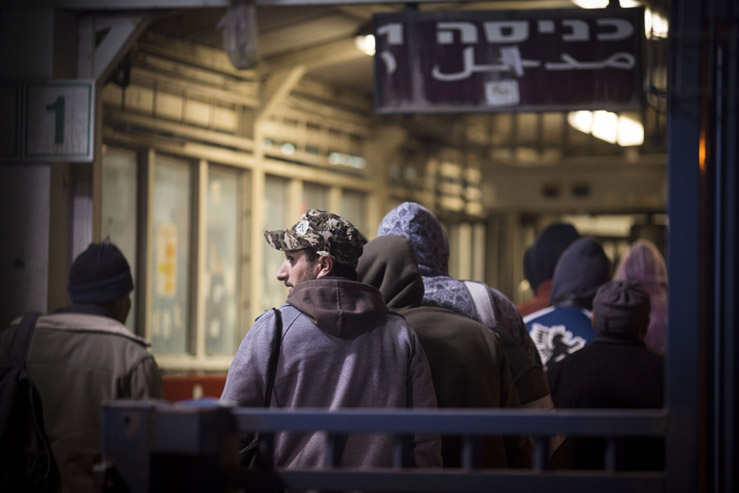Approximately 70,000 Palestinian workers from the Occupied Palestinian Territories (OPT) are currently employed in Israel, most in the field of construction, as well as many in agriculture, industry, and service jobs. An additional 30,000 are employed in the Israeli settlements. Kav LaOved assists more than 3,000 Palestinian workers per year regarding issues such as discrimination in salary and social rights, the “binding system” (workers’ inability to switch employers), poor safety conditions, withheld wages, and arbitrary cancellation of work permits by the Civil Administration.
Read More
Challenges
Lacking supervision by the Payroll Department: The Payroll Department is a governmental body established in 1970 whose role, in theory, is to supervise lawful payment to Palestinian workers and transfer reductions and taxes to various institutions. In practice, the Department concentrates mainly on transferring reductions and taxes to Israeli institutions. The Department blatantly encourages eliminating pension funds and compensation for work accidents, leaving workers and their families in great poverty in cases of work-related injury or even death.
Work accidents: If a Palestinian worker in the Israeli settlements finds him/herself in a work accident, Israeli law requires employers to document the incident and immediately send the worker to an Israeli hospital. After treatment, the Palestinian worker should receive benefits and compensation provided by the National Insurance Institute of Israel and the employer. However, there is a trend of employers sending workers to the West Bank for treatment, skirting costs, and responsibility for the workers’ well-being and rehabilitation.
Most Palestinian workers who receive work permits are employed in construction. Without effective government enforcement of the law, the rate of work accidents (mostly falling from large heights) in construction increases every year. After these accidents, Palestinian workers are left to pay for hospital bills and are given no benefits or compensation.
Abuse at checkpoints: Workers are forced to waste energy and time waiting at checkpoints, due to lack of efficiency in the checkpoint system and abuse and harassment by soldiers and security personnel.
Work without permits: Due to the quota set on the number of permits given to Palestinian workers, many have to work without a permit or with a merchant permit. This results in workers being more vulnerable to exploitation by their employers, who may threaten to report the worker for employment without a work permit.
Restricting the use of public transportation: Kav LaOved has received many complaints of bus drivers who refuse Palestinian workers’ entry onto buses, even if they hold a valid work permit. In October 2012, Kav LaOved caught on film an Israeli bus driver at the Tel Aviv Central Station refusing to allow Palestinian passengers on her bus to the settlement Ariel. At the end of November 2012, Haaretz reported that Israeli police were systematically removing Palestinians from buses and that Israel’s Transport Ministry planned to set up segregated bus lines for Israelis and Palestinians, a clear violation of human rights such as the right to movement and equality. The clip has gained over 46,000 views in English and Hebrew.
Achievements
In 2011, Kav LaOved filed a joint “Freedom of Information” petition with Gisha about the general lack of transparency regarding procedures to secure a work permit, a context that motivated the above-mentioned survey. Finally, facing national and international opposition to the occupation as well as this petition, the Israeli Civil Administration created a public website in 2012 geared at Israeli employers with official information on the process concerning the entrance of Palestinians into Israel.
Kav LaOved petitioned the High Court of Justice (HCJ) following a ruling made by the National Labor Court that rights of Palestinians who work in the Israeli settlements in the OPT are subject to change on a case-to-case basis. In response, the HCJ clearly stated that all workers shall receive their rights according to Israeli law, under all circumstances.
At the beginning of 2012, Kav LaOved recognized that Palestinian workers experienced difficulty in proving their actual work hours to their employers in the Israeli settlements. In order to address this, Kav LaOved increased the distribution of self-documented payslip forms and specific workshops on this issue to instill workers with the knowledge to document their hours themselves, ensuring valid evidence if there will be a need to approach the labor courts in the future. By the end of 2012, Kav LaOved recognized more compliance by settlers to minimum wage, resulting from their recognition that workers were collecting such evidence for potential lawsuits.
In August 2012, Kav LaOved released the report, “Employment of Palestinians in Israel and the Settlements: Restrictive Policies and Abuse of Rights,” based on the interviews and complaints of 514 Palestinian workers about work permits, collected in partnership with Machsom Watch (an Israeli NGO). This report sheds light on the process by which workers enter Israel and also makes recommendations to simplify this process vis-à-vis labor authorities inside Israel (the Payment Department at the Population and Immigration Authority at the Ministry of Interior) and the West Bank (employment staff officer at the civil administration).
Long-term cooperation with Palestinian workers’ unions in the OPT and the Palestinian Ministry of Labor has allowed Kav LaOved to reach thousands of workers and increase their level of awareness about Israeli labor law, as well as provide an effective remedy to workers rights violations.


